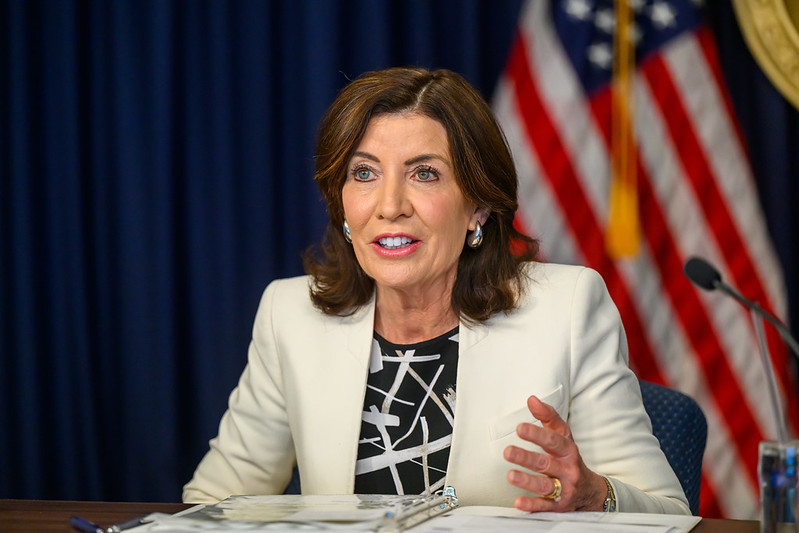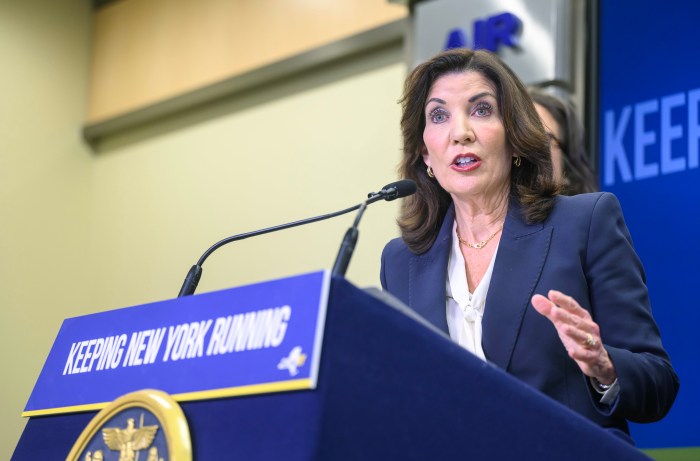Gov. Kathy Hochul is delaying the start of congestion pricing amid an important election year and last-minute concerns about the Manhattan toll plan’s economic impacts, a source confirmed to amNewYork Metro Wednesday morning.
Congestion pricing, which would charge $15 to most motorists entering lower Manhattan in a bid to reduce traffic and fund the MTA’s capital priorities, was scheduled to go into effect on June 30, five years after being approved by New York lawmakers.
But in a prerecorded video address, the governor confirmed that she would postpone the plan indefinitely, citing concern for the economic wellbeing of “the little guy.”
“In this moment of financial stress, high inflation, and already the high cost of living for so many New Yorkers, my focus must be on putting more money back in people’s pockets,” said Hochul. “And that’s why I must stand up for them and say no to implementing the congestion pricing toll at this time.”
The governor said that the calculus had changed since the plan was first approved in 2019, with a global pandemic upending how and when New Yorkers go to the middle of Manhattan.
“The idea behind congestion pricing is it’ll encourage many current drivers to shift to public transit,” said Hochul. “But there is a third possibility that now poses a greater threat than it did at the program’s inception: drivers can now choose to stay home altogether, telling employers they need to work fully remote again, or they might just change their patterns and skip the visits to the city on a Saturday with their family, or going out to a theater or a restaurant.”
The bombshell news that the first-in-the-nation plan would be shelved, three weeks ahead of its planned start date, was first reported Tuesday night by The New York Times and Politico citing concerns that the toll could hurt the city’s economy and endanger Democrats’ ability to retake several suburban congressional seats, and by extension retake control of the House of Representatives.
Politico reported that Hakeem Jeffries, the Brooklyn Congressman who leads the House Democrats, had raised worries to Hochul that the toll would negatively affect Democrats’ prospects in suburban districts outside New York City, several of which flipped red in 2022.
The governor dismissed talk that the decision was politically motivated, saying “I approach every decision through one lens: what is best for New Yorkers.”
The plan was set to raise $1 billion per year, which would be bonded out to generate $15 billion in revenue for mass transit improvements like modernizing subway signals and making the subway accessible for people with disabilities. The overwhelming majority of commuters entering Manhattan do so on mass transit, using an aging system that for decades was financially neglected by leaders in Albany.
Hochul said her administration has “set aside funding to backstop the MTA capital plan, and are currently exploring other funding sources,” though didn’t explain how much money was being set aside or what the alternative sources were. The governor did not take questions from reporters following the announcement.
Various outlets reported that the governor was exploring levying a new tax on New York City businesses as an alternative revenue source, but such a tax would have to be approved by the State Legislature, which is only in session for two more days this year.
Until now, Hochul has been publicly supportive of the program and has even explicitly rebuffed calls to rescind the program.
“Because of the action we’re taking today, millions of New Yorkers, millions of New Yorkers, will lead happier, safer, less stressful lives,” Hochul said last year after the Federal Highway Administration granted approval to the MTA’s environmental assessment for congestion pricing. She also noted the success of the program in other cities like London and Stockholm, where traffic congestion diminished significantly.
The MTA declined to comment.
An unpopular plan
Congestion pricing has polled poorly: 63% of respondents indicated they opposed the toll in a Siena College survey from April, compared to just 25% in support.
The program is also the subject of a slew of lawsuits seeking to overturn it. The MTA says the lawsuits have added such uncertainty to the mix that it has been unable to issue $9 billion in shovel-ready construction contracts, like for re-signaling the A/C line in Brooklyn and the B/D/F/M line in Manhattan.
MTA Chair Janno Lieber has said there is “no plan B” for transit construction priorities if congestion pricing doesn’t move forward. The agency has already completed installation of the overhead gantries that will automatically levy tolls via cameras.
“New York City public transit riders gave Governor Hochul her margin of victory in the 2022 election. Stopping congestion pricing before it even starts would be an outrageous betrayal of our trust,” said Betsy Plum, leader of the Riders Alliance. “Congestion pricing is the only public policy that can make our subway more reliable and accessible, speed up slow bus service, and help clear the air as wildfire smoke thickens. Governor Hochul must turn it on June 30 as planned.”
The Riders Alliance would not discount filing a lawsuit of its own to force the program through on time should Hochul delay it, said the group’s policy and communications director Danny Pearlstein.
Updated on June 5 at 11:32 a.m.
Read more: G train shutdown in Brooklyn causes commuting disruptions.


































